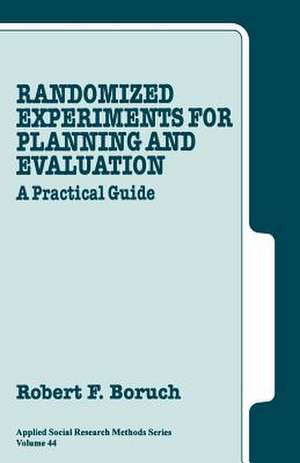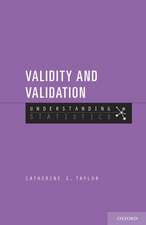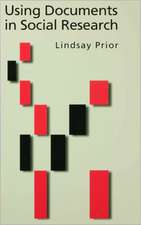Randomized Experiments for Planning and Evaluation: A Practical Guide: Applied Social Research Methods, cartea 44
Autor Robert F. Boruchen Limba Engleză Paperback – 18 feb 1997
Din seria Applied Social Research Methods
- 26%
 Preț: 534.80 lei
Preț: 534.80 lei -
 Preț: 323.98 lei
Preț: 323.98 lei - 26%
 Preț: 537.02 lei
Preț: 537.02 lei - 22%
 Preț: 405.00 lei
Preț: 405.00 lei - 22%
 Preț: 405.12 lei
Preț: 405.12 lei -
 Preț: 457.79 lei
Preț: 457.79 lei - 15%
 Preț: 604.85 lei
Preț: 604.85 lei - 15%
 Preț: 605.03 lei
Preț: 605.03 lei - 20%
 Preț: 610.14 lei
Preț: 610.14 lei - 20%
 Preț: 610.80 lei
Preț: 610.80 lei - 15%
 Preț: 547.75 lei
Preț: 547.75 lei - 18%
 Preț: 786.24 lei
Preț: 786.24 lei - 15%
 Preț: 548.57 lei
Preț: 548.57 lei - 15%
 Preț: 604.71 lei
Preț: 604.71 lei - 15%
 Preț: 547.75 lei
Preț: 547.75 lei - 15%
 Preț: 549.22 lei
Preț: 549.22 lei - 15%
 Preț: 547.43 lei
Preț: 547.43 lei - 15%
 Preț: 550.06 lei
Preț: 550.06 lei - 20%
 Preț: 551.90 lei
Preț: 551.90 lei -
 Preț: 314.78 lei
Preț: 314.78 lei -
 Preț: 465.49 lei
Preț: 465.49 lei - 20%
 Preț: 608.46 lei
Preț: 608.46 lei - 15%
 Preț: 613.54 lei
Preț: 613.54 lei - 15%
 Preț: 549.05 lei
Preț: 549.05 lei - 15%
 Preț: 602.08 lei
Preț: 602.08 lei - 15%
 Preț: 606.51 lei
Preț: 606.51 lei - 15%
 Preț: 549.22 lei
Preț: 549.22 lei - 20%
 Preț: 552.71 lei
Preț: 552.71 lei - 15%
 Preț: 550.06 lei
Preț: 550.06 lei - 15%
 Preț: 604.20 lei
Preț: 604.20 lei - 15%
 Preț: 605.36 lei
Preț: 605.36 lei - 15%
 Preț: 548.08 lei
Preț: 548.08 lei - 15%
 Preț: 606.15 lei
Preț: 606.15 lei - 15%
 Preț: 605.18 lei
Preț: 605.18 lei - 15%
 Preț: 546.45 lei
Preț: 546.45 lei - 18%
 Preț: 716.88 lei
Preț: 716.88 lei - 15%
 Preț: 438.13 lei
Preț: 438.13 lei - 20%
 Preț: 553.37 lei
Preț: 553.37 lei - 18%
 Preț: 717.66 lei
Preț: 717.66 lei
Preț: 611.09 lei
Preț vechi: 718.92 lei
-15% Nou
Puncte Express: 917
Preț estimativ în valută:
116.95€ • 121.64$ • 96.55£
116.95€ • 121.64$ • 96.55£
Carte tipărită la comandă
Livrare economică 14-28 aprilie
Preluare comenzi: 021 569.72.76
Specificații
ISBN-13: 9780803935105
ISBN-10: 0803935102
Pagini: 280
Dimensiuni: 140 x 216 x 18 mm
Greutate: 0.39 kg
Ediția:Will Be Reissue.
Editura: SAGE Publications
Colecția Sage Publications, Inc
Seria Applied Social Research Methods
Locul publicării:Thousand Oaks, United States
ISBN-10: 0803935102
Pagini: 280
Dimensiuni: 140 x 216 x 18 mm
Greutate: 0.39 kg
Ediția:Will Be Reissue.
Editura: SAGE Publications
Colecția Sage Publications, Inc
Seria Applied Social Research Methods
Locul publicării:Thousand Oaks, United States
Cuprins
Introduction
Experiments in the Context of Evaluation
Ethics, Law and Randomized Experiments
Population, Power and Pipeline
Randomization Plans and Process
Identifying, Engaging and Maintaining Contact with Target Individuals
Observation and Measurement
Operations
Analysis
Reporting
Experiments in the Context of Evaluation
Ethics, Law and Randomized Experiments
Population, Power and Pipeline
Randomization Plans and Process
Identifying, Engaging and Maintaining Contact with Target Individuals
Observation and Measurement
Operations
Analysis
Reporting
Notă biografică
Before coming to the University of Pennsylvania in 1989, Dr. Boruch was a member of Northwestern University¿s faculty. He has served on the Board of Trustees for the W. T. Grant Foundation and the Board of Advisors for the National Science Foundation¿s Education and Human Resources Division. He currently serves on the Board of Directors for the American Institutes for Research. He has served on advisory committees for the U.S. Department of Education, Government Accountability Office, National Center for Educational Statistics, National Institutes of Health, and other federal agencies. He has served on advisory committees for the U.S. Department of Education, Government Accountability Office, National Center for Educational Statistics, National Institutes of Health, and other federal agencies. He has most recently served on the National Academy of Sciences Committee on Field Evaluation of Behavioral and Cognitive Science Based Methods and Tools for Intelligence and Counter Intelligence, and has served on numerous NAS committees including on AIDS Prevention Programs, Noise Impact of the Concorde, Privacy in the U.S Census, and Scientific Principles in Education Research. Dr. Boruch is also on the advisory boards of the Coalition for Evidence Based Policy and the Board of Directors of the Society for Research on Educational Effectiveness and serves on the editorial boards of Evaluation Review, Journal of Experimental Criminology, and the Journal of Research on Educational Effectiveness.
Dr. Boruch is an elected fellow of the American Academy of Arts and Sciences, the Academy for Experimental Criminology, the American Educational Research Association, and the American Statistical Association. He has been a senior fellow at the Center for Advanced Studies in the Behavioral Sciences (Stanford) and at the Rockefeller Foundation¿s Bellagio Study Center and a visiting fellow at research centers in Berlin, Mannheim, and Munich. He has also received awards for his work from the American Educational Research Association, the Policy Sciences Organization, the American Evaluation Association, and the international Campbell Collaboration. The Campbell Collaboration has named an award in his honor for individuals who contribute to the use of better evidence in policy.
Dr. Boruch is an elected fellow of the American Academy of Arts and Sciences, the Academy for Experimental Criminology, the American Educational Research Association, and the American Statistical Association. He has been a senior fellow at the Center for Advanced Studies in the Behavioral Sciences (Stanford) and at the Rockefeller Foundation¿s Bellagio Study Center and a visiting fellow at research centers in Berlin, Mannheim, and Munich. He has also received awards for his work from the American Educational Research Association, the Policy Sciences Organization, the American Evaluation Association, and the international Campbell Collaboration. The Campbell Collaboration has named an award in his honor for individuals who contribute to the use of better evidence in policy.
Descriere
How can one tell if a new programme has been effective or not? Is there any way to predict how a group of individuals would have fared without the new programme or service? Packed with rich and varied examples, Robert F Boruch's book untangles the complexities of randomized field experiments to enable researchers to evaluate better the impact of new programmes. After an exploration of how to judge whether or not a programme worked, the author discusses: the context of experiments; the standards used to judge the ethical propriety of randomized experiments; methods for studying populations; sampling methods; the randomization procedure; baseline measures; missing data registry; and analyses for quality assurance.














